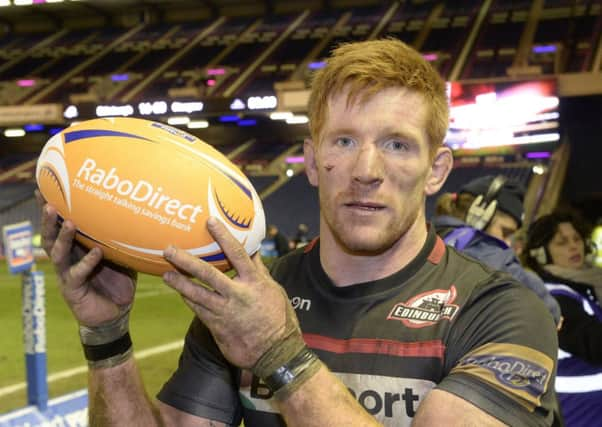Allan Massie: Little for fans to cheer in derby


One can hardly blame props for going to ground when the footing is so loose.
It would make good sense for Edinburgh to play their January Heineken match against Perpignan elsewhere to give the surface a chance to recover before the Calcutta Cup game on 8 February. Of course, Scott Johnson & Co may judge that when England come to town, a rotten pitch will even the odds against us somewhat.
Advertisement
Hide AdAdvertisement
Hide AdEdinburgh will be kicking themselves for losing a match in which they were on top and in the lead for so long. Indeed, they should have been well out of sight before Glasgow snatched victory with a good try created by Alex Dunbar and DTH van der Merwe and finished by Stuart Hogg.
On the credit side, their new coaching team has certainly tightened up their defence and, in the first half at least, Edinburgh were regularly winning what it is now fashionable to call “the collisions”. For most of the match, their back-row of Cornel du Preez, David Denton and Roddy Grant was very much on top. On the debit side, their style is now very predictable. If a spectator can anticipate the direction of their attack and get it right almost every time, one must assume that the opposition will find no great difficulty in doing so too. Edinburgh give the impression that they are playing by numbers.
Finally, what must make their supporters’ disappointment all the more bitter is the reflection that, for most of the 80 minutes, Glasgow were really desperately poor. Yet snatching this win in a game where they were second best for so long may give Glasgow the boost to end their recent run of poor form.
It’s hard to see that Scott Johnson can either have learned anything or taken any encouragement from the match, though it might persuade him to wonder why he has consistently ignored Grant, who almost never has a bad game and who, on present form, is surely the best No7 fit and available to him. Perhaps Grant is stuck with the label, “fine club player but not big enough for international rugby”. There was a time when English coaches used to say that about Neil Back, who eventually shook off the label to become a key member of Clive Woodward‘s team.
The Scotland coach may console himself with the thought that seven of the leading candidates for positions in his pack – Euan Murray, Jim Hamilton, Richie Gray, Kelly Brown, Johnnie Beattie, Alasdair Strokosch and John Barclay – weren’t in evidence on Thursday since they play their rugby in England, France or Wales. This is fair enough, though it does mean that it is harder to measure their form against that of home-based forwards. Distance can, as the saying goes, lend enchantment to the view and there is always a temptation to think exiles superior to the talent at home.
That said, I would suppose that Johnson is less worried about his pack than about the players behind it. Max Evans and Duncan Taylor were the only backs among those who featured in the autumn internationals to be playing for a club other than Edinburgh or Glasgow. Cynics may see this as a reflection of the quality of Scottish back play – not in demand in France or England. Such a judgement may be harsh. Nevertheless, the difficulty Scotland experience in scoring tries, and the inability of either Glasgow or Edinburgh to collect many try-scoring bonus points in the Rabo 12 or Heineken this season, make it not unreasonable. Nor does the likely absence of Matt Scott and Tim Visser from the opening Six Nations matches brighten our prospects.
Presumably Greig Laidlaw will be at scrum-half, though Chris Cusiter, fit and with a run of games behind him, is surely snapping at his heels. The back three – wings and full back – pose at most a juggling problem, especially if Sean Lamont is fit again. So the problem positions remain 10, 12 and 13. Duncan Weir seems to have edged ahead of Ruaridh Jackson again in recent weeks, though he had an indifferent game in the inter-city; indeed, one might argue that Greg Tonks, pressed into emergency service at fly-half for Edinburgh, looked more composed and varied his game better.
Nick De Luca remains probably our best available outside centre, though it was unfortunate that the early injury to James Seymour and the subsequent re-arrangement meant that there was little opportunity to assess Stuart Hogg’s play at 13. As for 12, assuming Scott is not back, Alex Dunbar looks the best bet on recent form, though one would really like to see him and Scott in partnership.
Perhaps the return inter-city next week will clarify matters. Let us hope anyway that conditions allow that game to flow more than the first round at Murrayfield did.